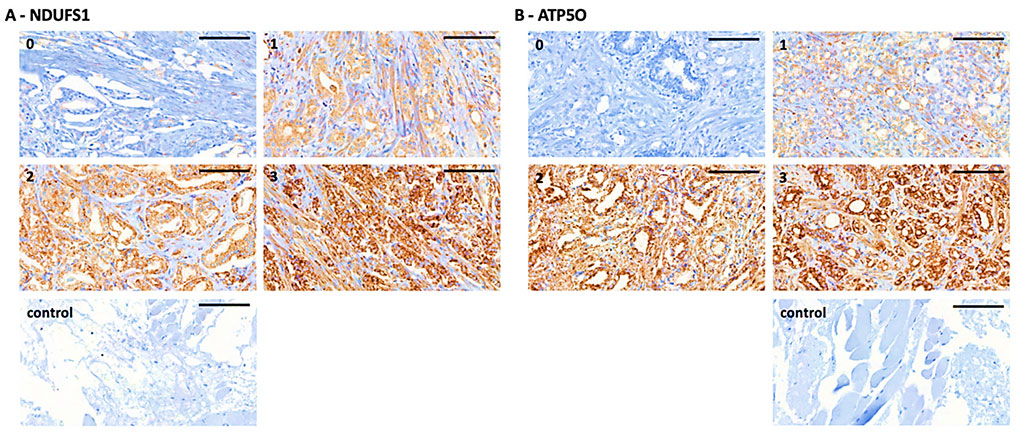Novel Protein Biomarkers Identified for Prostate Cancer Aggressiveness
By LabMedica International staff writers
Posted on 05 Jan 2022
Prostate cancer is the most commonly diagnosed cancer in men and is among the top five causes of cancer-related death. In most cases, prostate cancer can be successfully treated but there is a group of patients who suffer an aggressive course and often fatal outcome.Posted on 05 Jan 2022
In order to be able to treat prostate cancer more efficiently, it is necessary to understand the complex processes in the tumor at the molecular level. Though multiple genomic and transcriptomic-based analyses have been conducted, the results have not yet contributed to an improvement of diagnostics and therapy of Prostate cancer (PCa) patients.

Image: A) NDUFS1 immunohistochemistry staining of prostate cancer (PCa) tissue microarray (TMA) samples and B) ATP5O immunohistochemistry staining of PCa TMA samples. Staining intensity as per number. Scale bar = 100 µm (Photo courtesy of Medical University of Vienna)
Clinical Scientist at the Medical University of Vienna (Vienna, Austria) and their colleagues acquired formalin-fixed and paraffin-embedded (FFPE) prostate material from 88 patients with primary PCa and seven patients with bladder cancer. Human tissue-microarray (TMA) generation as well as sample selection and preparation for laser microdissection were conducted.
Immunohistochemistry was conducted on FFPE TMAs using consecutive sections. Staining was performed using the BenchMark ULTRA automated staining system Ventana Medical Systems, Tucson, AZ USA). The samples were analyzed using an Olympus system (Tokyo, Japan). Proteomic Liquid Chromatography Tandem Mass Spectrometry (LC-MS/MS) Analysis was also performed.
The investigators reported that retrospective data analysis identified 153 proteins differentially expressed between STAT3-low and STAT3-high samples. Out of these, 46 proteins were associated with mitochondrial processes including oxidative phosphorylation (OXPHOS), and 45 proteins were upregulated, including NDUFS1/ATP5O. In a STAT3 independent PCa cohort, high expression of NDUFS1/ATP5O was confirmed by immunocytochemistry (IHC) and was significantly associated with earlier biochemical recurrence (BCR). mRNA expression levels for these two genes were significantly higher in intra-epithelial neoplasia and in PCa compared to benign prostate glands. NDUFS1/ATP5O levels are increased both at the mRNA and protein level in aggressive PCa.
The authors noted that further analyses of the transcriptome, which comprises all genes that are transcribed in the cell at a certain point in time, also showed a rectified shift in the concentration of messenger ribonucleic acid (mRNA). This means that there is a direct correlation between the genetic transcripts and the proteins produced. The study represents an important step in establishing a link between NDUFS, ATP5O and cancer aggressiveness. NDUFS1 and ATP5O could therefore serve as additional immunohistochemical markers for aggressive prostate tumors and, at the same time, as new targets for cancer treatment. The study was published on November 30, 2021 in the journal Cancers.
Related Links:
Medical University of Vienna
Ventana Medical Systems
Olympus










 Analyzer.jpg)



